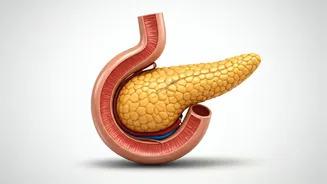Unexplained Abdominal Pain
One of the earliest and most common red flags is abdominal pain. This discomfort often presents as a dull ache in the upper abdomen, frequently radiating
to the back. It may come and go, making it easy to dismiss as indigestion or a minor stomach upset. However, persistent or worsening abdominal pain, especially if it's accompanied by other symptoms, needs immediate medical attention. It's crucial to consult a healthcare professional to determine the root cause, as this could be an early indicator of pancreatic cancer. Ignoring this symptom could lead to delayed diagnosis and potentially limit treatment options.
Changes in Stool Habits
Noticeable alterations in bowel movements can also signal a problem. These changes may include pale, greasy stools that float, a condition known as steatorrhea. This occurs because the pancreas is not producing enough enzymes to properly digest fats. Furthermore, the urine might become unusually dark. These symptoms are often accompanied by other gastrointestinal issues, such as nausea, vomiting, or changes in appetite. These symptoms are easy to overlook, but recognizing them as potentially serious signals can facilitate the prompt seeking of medical advice and could be a crucial step in the early detection process.
Unexpected Weight Loss
Unexplained weight loss is another important indicator. Often, this is a result of the body's inability to absorb nutrients properly due to the impaired pancreatic function. Even if you maintain your regular eating habits, you may still shed weight without an apparent cause. This should not be ignored, especially if it occurs alongside other warning signs. If you experience unexpected weight loss, consult a doctor immediately. Rapid weight loss can indicate several underlying health conditions, and in the case of pancreatic cancer, it often arises as the tumor progresses and interferes with normal bodily functions. Early detection and intervention become critical when weight loss is unexplained and persistent.
Onset of Jaundice
Jaundice, the yellowing of the skin and eyes, is a more obvious but often late-stage symptom. It is caused by a buildup of bilirubin, a waste product that the liver usually processes. With pancreatic cancer, the tumor can block the bile duct, hindering the flow of bile and leading to jaundice. Along with yellowing skin and eyes, jaundice may cause itchy skin and dark urine. The presence of jaundice is a significant warning sign that needs immediate medical evaluation. While it can also indicate other conditions, its appearance should never be disregarded, especially when linked with other potential signs of pancreatic cancer.




















